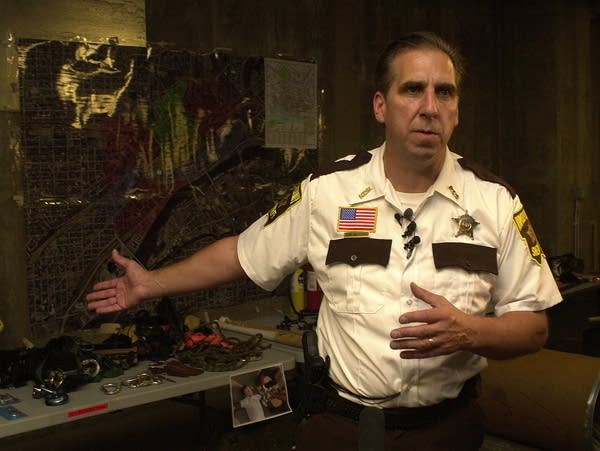Criminal intelligence bill runs into stiff opposition at Capitol
Go Deeper.
Create an account or log in to save stories.
Like this?
Thanks for liking this story! We have added it to a list of your favorite stories.

The bill defines a new kind of government information in Minnesota, and would keep the data secret for at least a year.
Criminal intelligence would include tips that a crime is in the offing, or incidental data that could prove useful later.
Police are pushing for a law that defines that information, and how that information is handled. They want more authority, for example, to keep suspects from finding out what police know, and to keep incorrect or embarrassing information from spreading.

But opponents worry that would keep the public from keeping an eye on the police.
Turn Up Your Support
MPR News helps you turn down the noise and build shared understanding. Turn up your support for this public resource and keep trusted journalism accessible to all.
Teresa Nelson is an attorney with the Minnesota chapter of the American Civil Liberties Union.
"We believe this will provide a roadmap to law enforcement agencies to create and maintain secret political dossiers on people engaged in First Amendment activities, political activist groups," said Nelson. "We believe we should not sacrifice liberty for the illusion of security that bills like this provide."
Nelson and others testified for nearly an hour before the House Crime Victims and Criminal Records committee. They debated the merits of better record-keeping and communications on one hand, and on the other, the fear that government would spy on its citizens.
The head of the state's criminal information network said there's nothing to be feared.
"This will provide a road map to law enforcement agencies to create and maintain secret political dossiers."
"Heavens no," said David Johnson, the former Blaine police chief and executive director of Minnesota Justice Information Systems, a division of the state's Bureau of Criminal Apprehension. "This is the farthest thing from it. This is to manage data that are currently existing, within the framework of the public safety communities throughout Minnesota."
Johnson said existing law is clear about, for instance, details of an active criminal investigation or car accident.
But Johnson said the law isn't as clear about more mundane information, such as a call about lots of traffic at a neighbor's house or a tip about strange noises in the garage across the alley.
The BCA cites the example of Zacarias Moussaoui, the alleged 9/11 hijacker who was arrested after a Minnesota flight instructor grew suspicious that Moussaoui wanted to learn how to fly jumbo jets, but not how to land them.
What he was doing wasn't illegal, but it certainly proved to be of great interest in the wake of the terror attacks of 2001.
The bill's sponsor, Rep. John Lesch, DFL-St. Paul, said it's better to define and document that data, rather than simply hope it finds its way into the right hands. He said a stronger law could encourage law enforcement to better share that information.
Lesch said it could even benefit the people that police are tracking.
"Right now, a law enforcement agency doesn't have to account for that at all," said Lesch. "If you're going to sue someone, because they're illegally categorizing people based on race or religion, there's really no way for you to find that out."
But critics point out one passage in the bill that specifically gives police the authority to collect information on the political, religious and social views of the people they encounter.
United Food and Commercial Workers union organizer Bernie Hesse said he worried that might include investigations of organized labor.
Peace activists told the House panel it would legitimize the infiltration of their organizations, and block their right to protest.
FBI whistleblower Colleen Rowley said systematically collecting secret, non-criminal information inevitably invites abuse of police authority.
"Every agency has been caught in scandals," Rowley said. "My own FBI was caught in 200,000 letters that led to banking information, telephone tolls, travel information being put into computers."
Even some law enforcement officers are wary of the idea. Ramsey County Sheriff Bob Fletcher said in an interview that his agency has the tools it needs already.
"The law is clear that if you have an active investigation, it can remain confidential," said Fletcher. "What more do you need? You don't need large intelligence files."
The committee set aside the bill, and Rep. Lesch said it's probably dead for the session. But he said he hopes to rework the bill and bring it back, perhaps next year.



